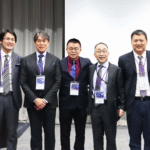
The 16th International Gastric Cancer Congress (IGCC 2025), hosted by the International Gastric Cancer Association, will take place from May 7–10, 2025, in Amsterdam, the Netherlands. The Oncology Frontier will be on-site to bring readers real-time updates and firsthand coverage of key developments from the congress.According to the official agenda, at 9:00 AM local time on May 8, during the Plenary Session I: Current Trials, Professor Zekuan Xu from The First Affiliated Hospital with Nanjing Medical University will deliver an invited presentation titled “Current Trials in China.” The abstract for this important report has already been released.
Let’s take a closer look at some of the key highlights and anticipated insights from Professor Xu’s upcoming talk.
According to the official congress schedule, Professor Zekuan Xu from The First Affiliated Hospital with Nanjing Medical University is scheduled to deliver an invited presentation titled “Current Clinical Trials in China” at 9:00 AM (local time) on May 8, 2025, during Plenary Session I: Ongoing Trials.
The abstract of Professor Xu’s presentation has already been released, offering a preview of the key topics he will address. Let’s take a first look at some of the noteworthy highlights expected in his talk, which will shed light on the current landscape and future directions of gastric cancer clinical research in China.
Preview of Professor Zekuan Xu’s IGCC 2025 Presentation: A Snapshot of China’s Current Clinical Research in Gastric Cancer
In his upcoming invited talk at IGCC 2025, Professor Zekuan Xu from The First Affiliated Hospital with Nanjing Medical University will offer an in-depth overview of China’s evolving landscape in gastric cancer clinical research. His abstract reveals a field marked by meaningful progress in surgical techniques, neoadjuvant strategies, and perioperative care, while also acknowledging the pressing challenges that remain.
In recent years, China has achieved significant results in gastric cancer research. However, unresolved issues still pose barriers to further advancement. While global research is at the forefront of early detection technologies, precision medicine, and molecularly targeted therapies, Chinese research has largely centered on refining surgical procedures, enhancing neoadjuvant therapies, and improving perioperative management.
In the treatment of early gastric cancer (EGC), endoscopic mucosal resection (EMR) and endoscopic submucosal dissection (ESD) have shown strong efficacy in patients at extremely low risk of lymph node metastasis. These minimally invasive techniques are now widely accepted as effective options in selected patients.
In the area of neoadjuvant therapy, China has made notable breakthroughs. The bispecific antibody AK104, which targets both PD-1 and CTLA-4, has demonstrated promising efficacy and is now being explored in the setting of neoadjuvant immunotherapy. Another promising area is the development of monoclonal antibodies against Claudin18.2. These therapies show high potential in ongoing trials, particularly for patients whose tumors express Claudin18.2 at high levels.
In surgical treatment, the Chinese Laparoscopic Gastrointestinal Surgery Study Group (CLASS) has contributed extensively. The CLASS-01 trial demonstrated that laparoscopic distal gastrectomy is comparable to open surgery in treating locally advanced gastric cancer, laying the foundation for the widespread adoption of laparoscopy in China. The CLASS-02 study further confirmed that laparoscopic total gastrectomy matches open surgery in both safety and efficacy. Meanwhile, the introduction and growing use of the da Vinci robotic surgical system—explored in studies such as CLASS-03—have further improved surgical precision, reduced invasiveness, and enhanced overall safety. These advancements in minimally invasive surgery not only accelerate postoperative recovery but also significantly improve patient quality of life. Additionally, clinical trials on hyperthermic intraperitoneal chemotherapy (HIPEC) are currently exploring its value in preventing peritoneal metastasis, with early results suggesting a notable extension in disease-free survival.
In the treatment of advanced gastric cancer, the integration of immunotherapy into first-line chemotherapy regimens has substantially expanded therapeutic possibilities. Studies such as GEMSTONE-303, RATIONALE-305, and KEYNOTE-859 have demonstrated that PD-1/PD-L1 inhibitors—such as sugemalimab, tislelizumab, and pembrolizumab—can significantly improve progression-free survival (PFS) and overall survival (OS), especially in patients with high PD-L1 expression. These findings provide several effective immunotherapy options for advanced disease.
Despite these achievements, significant challenges remain. The scarcity of high-quality multicenter randomized controlled trials (RCTs) in China continues to limit the reliability and generalizability of research findings. Furthermore, many innovations in immunotherapy and targeted treatment still rely on global developments, with relatively few breakthrough discoveries originating from domestic efforts.
Overall, while China has made considerable strides in surgical technique, neoadjuvant therapy, and the incorporation of artificial intelligence, there remains a critical need to expand the scale and improve the quality of RCTs. Promoting domestic drug innovation, strengthening research in molecular diagnostics, and broadening access to early screening programs will be essential. Looking ahead, China must prioritize international collaboration, increase investment in basic and clinical research, and accelerate the development of homegrown therapeutic strategies. These efforts will be vital to enhancing the standard of gastric cancer care and improving patient outcomes nationwide.


